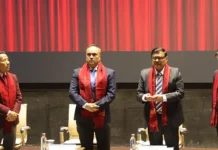ITANAGAR, Feb 18: Education Minister Taba Tedir acknowledged that there are several “deficiencies” in the higher education system in the state as colleges are being opened without having in place proper infrastructure and prerequisite facilities.
“Even land allotment, land possession certificates, college master-plans, boundary walls, etc, are not available with the institutions. All such things are required for further future development and to avoid haphazard growth of institutions,” Tedir said during the 20th Higher & Technical Education Conference held here on 17 February.
Informing that a regulatory commission for the private universities functioning in the state has been created, he said the commission will become operational very soon.
Expressing concern over the enrollment of fewer students in the government polytechnics, he called for “introspection” to arrest the declining enrollment.
The minister informed that the state will soon have two engineering colleges – one in Toru, in Papum Pare district, and the other in Lohit HQ Tezu. They will be established with fund from the RUSA, he said.
Education Secretary Niharika Rai highlighted various initiatives being taken to motivate college faculty members, “such as excursions to foreign universities, funding for research, and timely APIs.”
She asked the faculties of various higher and technical institutes to make students aware of the benefits available to them from the state government, “such as career counselling modules, scheme for coaching support in preparation for UPSC, IIT-JEE, excursions, etc.”
Rai also emphasized on “promoting sports as an alternative way of education.”
Higher & Technical Education Director, Dr Tayek Talom, informed that the directorate is “working as a tool of change, preparing the way for new and better social order through education.”
“Effort is to create an enabling atmosphere in the higher educational institutions to promote the stakeholders, with special focus on students and teachers, to devote themselves to teaching-learning process and research and innovations to meet national and global challenges,” he said.
To impart language and soft skills, he said, the department is arranging collaboration with the British Council.
“Until school education, particularly at secondary and higher secondary level, is improved, quality requirements in higher education are not possible,” he said, adding that quality improvement at the school level “is a precondition to ensure a better higher education system in the state.”
“Therefore, necessary changes in school education have to come up in line with the efforts of higher education,” he added.


